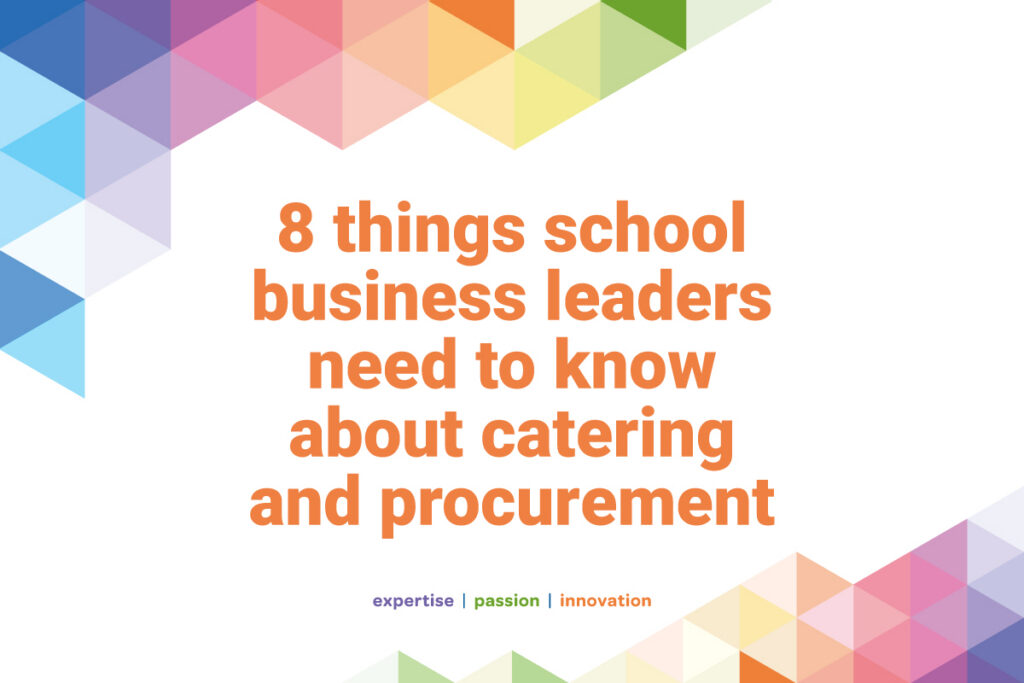In today’s educational landscape, school leaders are tasked with navigating an ever-growing list of responsibilities – from educational outcomes to financial management. One critical yet often complex area is catering and procurement. Done well, it can enhance pupil wellbeing, drive efficiencies, and deliver real value for money. Done poorly, it can become a drain on resources and a source of dissatisfaction for pupils and staff alike.
Here at Litmus, we’ve worked with hundreds of schools across the UK – some which run their catering in-house and others which outsource it – and we’ve distilled the key things every school leader should know when managing catering and procurement in their school or trust.
- No, the contractor doesn’t really pay the consultant
For schools which outsource their catering, if you’re ever told that a catering contractor will cover your consultant’s fees, be cautious. While it may seem like a cost-saving offer, in reality, those fees are likely built into the contractor’s overall pricing – and ultimately passed back to you.
A truly independent consultancy should be working exclusively for you, not the supplier. Their role is to secure the best possible outcome for your school – not to maintain relationships with contractors who may, directly or indirectly, fund their services.
- The power of good data in measuring value for money
Catering is often one of the biggest budget lines for a school. How do you know you’re getting good value? At Litmus, we draw on the largest source of contractor data in the UK, covering more than 750 schools, and updated monthly by mainstream and independent providers.
This enables us to benchmark your caterer’s or catering teams performance – financially and operationally – against others across the sector. Are they aligned with best practices? Are they meeting sustainability goals and student satisfaction levels? Good decisions require good data.
- Invest in a catering management system
If you deliver your catering in-house, systems like Litmus Edge can deliver measurable benefits. On average, schools using Edge see a 20% reduction in overall catering costs and save 15 hours per month on kitchen administration time.
Edge streamlines everything from ordering and stock management to compliance and reporting – so your team can focus on food quality and service delivery.
- Maximise Free School Meal (FSM) uptake and the benefits that come with it
Free School Meals don’t just support pupil nutrition – they can unlock significant funding through the Pupil Premium. But to realise this benefit, eligible pupils need to be signed up and actively using the service.
To encourage uptake there are a few things school leaders can do:
- Allow FSMs to be spent not just at lunch, but at mid-morning breaks too. Mid-morning is often the preferred time for students to purchase their lunch; some may not have had breakfast and be hungry at that point, or they may want to buy their food at morning break to save them having to queue and buy it at lunchtime, if they have any clubs or groups to attend at lunch break.
- Offer variety: Ensure pupils on FSMs have a range of meal options within their allowance. Hot and cold choices, that change daily and cater towards a variety of dietary requirements, is key. Meal deals, that offer a quality meal at a value price, also go down well. Again, don’t just offer one meal deal – aim for six meals deals each day – and ensure they all have a cash tariff equivalent to that of the FSM allowance.
- Make FSM easily accessible and discreet for pupils. Cashless and online payment systems have helped with this as the payment processes look identical to those paying for school lunches. However, there should also be consideration given on school trip days. Often FSMs are more visible as packed lunches are provided in brown paper bags, and often their friends may take money to buy lunch when on the trip. Encouraging all pupils to take a school packed lunch will help, as will avoiding trips to cafes or eateries that result in some children unable to buy any food, when their friends are.
- Food fuels learning – prioritise quality nutrition
There’s strong evidence linking good nutrition with improved cognitive function and classroom behaviour. One way to embed this is by partnering with your suppliers to create a ‘brain food’ range: meals that are rich in omega-3s, whole grains, and fresh produce.
Also consider hydration stations and promoting a refill culture across the school. Even mild dehydration can impact concentration, so easy access to water is a simple but powerful step.
- Social value and sustainability matters
Your catering term or your caterer should be contributing to your school’s broader goals around community engagement, sustainability and pupil wellbeing. Are they using local suppliers? Are they reducing food waste? Are they employing locally and supporting skills development?
- Ensure the KPIs reflect what really matters
Key Performance Indicators (KPIs) should go beyond just cost and service speed. Tracking pupil satisfaction, via surveys or focus groups, will go a long way in ensuring the food offering is aligned to what your pupils are looking for, helping to drive sales and reduce plate waste.
At Litmus, we help schools set and monitor KPIs that align with both financial and educational outcomes.
- Transparency builds trust
If you outsource your catering, whether you’re going through a tender process or managing an existing contract, transparency is key. Make sure your consultant is open about how decisions are made, how performance is tracked, and how their recommendations are formed. Your school deserves advice that is independent, data-driven, and in your best interest.
School catering and procurement may not always feel like front-line priorities – but when handled strategically, they can be transformative. From improving pupil wellbeing and learning outcomes to driving efficiencies and unlocking funding, the benefits are far-reaching.
To hear more about how we can support you as a school business leader get in touch here
The Litmus team











